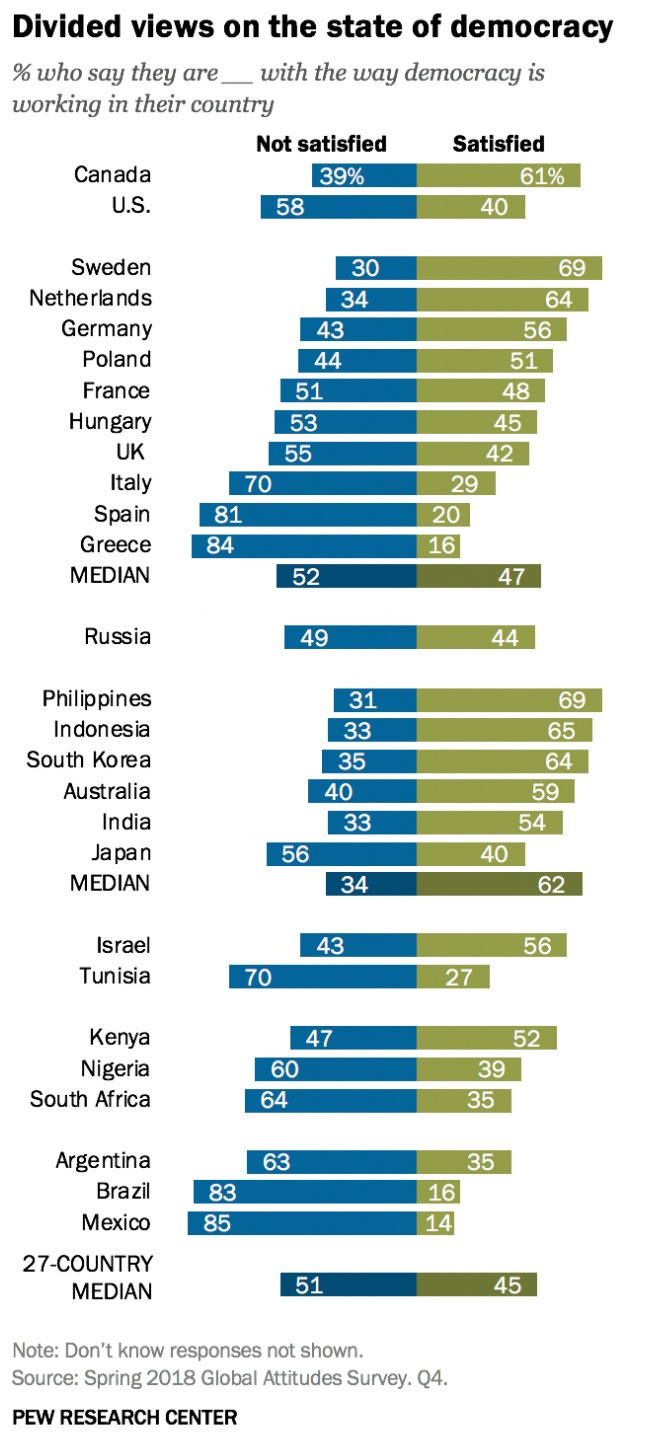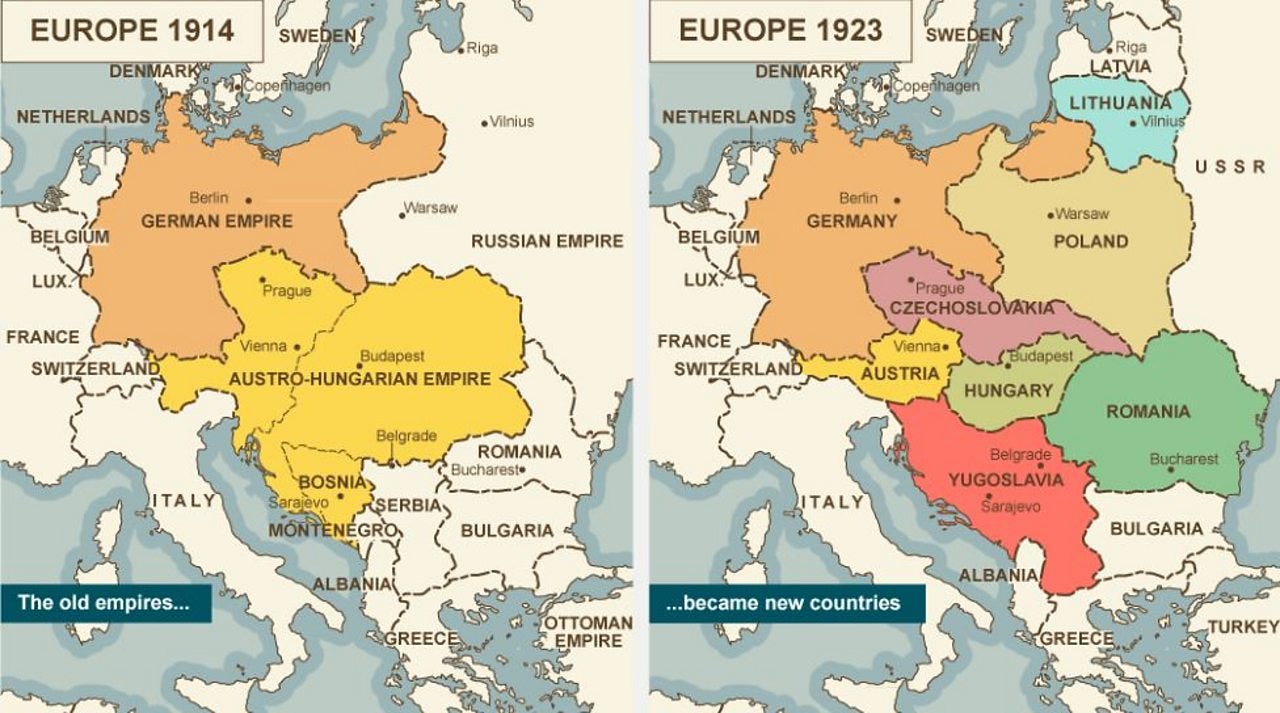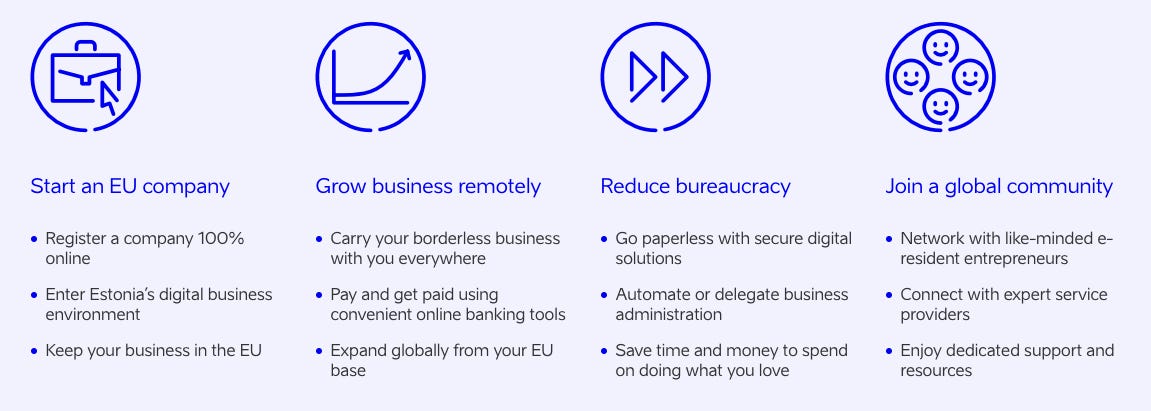The Sovereign Individual
In South Africa, my home country, complaining about the government’s failings is a national pastime. The government’s ineptitude can be demoralising and can make it hard to dream of a bright future within the country’s borders.
But South Africa is not unique. In most nations, governments are not universally adored by their citizens. The stats below indicate how (un)satisfied people are with the results of democracy in their countries.

To drive change, you can vote in elections, but in general, this doesn't change much. You’re also stuck if most citizens don’t vote the same way as you do. You can also instigate a revolution or a war, but that rarely ends well.
So we end up tolerating governments largely because we have no other choice. It’s either that, or you leave a country you love to set up shop in a prosperous first-world nation. Or we can follow Elon Musk to Mars. But that may take a while, and apparently, the beaches and parks there aren’t great.
But maybe the world is developing in a way that gives us more options. This week, I want to explore this question and test the idea of shifting from the sovereign state to the sovereign individual.
The birth of nation-states
The United Nations comprises 193 member states, the newest of which being South Sudan which became a sovereign nation in 2011. But countries, as we know them, didn’t always exist. The concept of a sovereign state was adopted through the Peace of Westphalia in 1648 following the Thirty Years’ War between Protestants and Catholics involving many European nations. It recognized, for the first time, the right of states to govern their territories without external interference.
Following the French Revolution and the establishment of the British Commonwealth, the concept of nation-states evolved from Europe and spread worldwide. In the 1900s, events like WWI and the Treaty of Versailles also dramatically altered border lines.

If you want to dig deeper, you can watch this video (optional) to see how civilizations and nations have risen and fallen since the dawn of time (for the changes since 1800, skip to the 17m mark). As you can see, the changes during the last 200 years alone have been dramatic.
A defining characteristic of all nations is that they rule over a geographic area, making citizens reliant on the state that wields control over matters within its borders. So if you want to live in a specific geographic area, your life will be heavily influenced by the incumbent state.
But countries and civilizations are not ordained by nature. They are human-made constructs and have evolved along with us and will continue to do so.
Hold this thought as I move on to the next point.
“Micronations”
I’m going to use South Africa to illustrate my next point, but the idea also applies to other developing nations.
If you want to live in South Africa, a fabulously diverse country with natural beauty second to none, you have to put up with a largely incompetent government with a mostly abysmal track record on education, health, security and keeping the lights on. To counter this, South Africans have found ways to circumvent the state by creating world-class privatised healthcare, security and education facilities. The private-security sector employs more than three times as many people as there are in the police force, and about 5% of South African children are educated privately. The privileged have also been seeking refuge in enclaves in the form of affluent towns or suburbs or in private and largely self-contained mega-estates (example below).

Essentially, those with the means to do so are trying to ditch the state and take matters into their own hands by creating self-determining “micronations” within the confines of South Africa’s borders. But the effectiveness of this strategy has its limits, because even if you live in a micronation, it’s tough to escape the ailing local economy and South Africa’s crippled currency. And because the micronations have been based solely on geographic pockets, they can’t really scale, limiting their influence and self-determining power.
However, technology may change things.
Network states
Introducing Balaji Srinivasan
At the beginning of 2020, whilst scrolling on Twitter, I stumbled upon Balaji Srinivasan. Although his resume is riddled with academic (multiple engineering degrees, including a PhD) and business accolades (e.g. former Coinbase CTO and serial entrepreneur), what caught my attention was his early commentary and accurate predictions around the rising threat of Covid. See, for example, this tweet from Jan 30, 2020:
I’ve been following him since and find him to be one of the most intellectually astute people I have ever come across. I marvel at the breadth and depth of his knowledge.
But it’s Srinivasan’s latest musing that’s been on my mind.
Digital communities
Srinivasan predicts the rise of enhanced digital communities. Cultures that are built online, but physically distributed across the globe, with each physical outpost resembling a “cloud embassy”. So imagine multiple micronations across the globe, all digitally networked.
The idea sounds like sci-fi, but most of the technology to make this happen already exists. Covid has proven that most white-collar jobs can be done remotely, and the ever-evolving stack of communication tools make it possible to plug into a job anywhere in the world. Critical services are also rapidly being transformed by the digital world. There is, for example, a boom in online education on the go (e.g. Valenture Institute), and tech giants like Amazon are taking on the healthcare space.
The potential impact of cryptocurrencies
Thanks to the increasing adoption of cryptocurrencies, communities can theoretically bypass the government and create their own currencies (or link to existing cryptocurrencies) and remit funds worldwide with the same ease as sending a WhatsApp. The discussion around cryptocurrencies is not limited to bitcoin's price, but extends to a disruption of the financial system (see DeFi). I like Naval Ravikant’s view that crypto should be seen as voting rather than investing. Cryptocurrencies are becoming a considerable force, and their growth may become a self-fulfilling prophecy for more growth.

Scalability
The particularly interesting thing about digital communities is that they are scalable. As Balaji says:
Once we remember that Facebook has 3B users, Twitter has 300M, and many individual influencers have more than 1M followers, it starts to be not too crazy to imagine we can build a 1-10M person social network with a genuine sense of national consciousness, an integrated cryptocurrency, and a plan to crowdfund many pieces of territory around the world. With the internet, we can digitally sew these disjointed enclaves together into a new kind of polity, a network state.
And how big does the network have to be to start wielding global influence? By comparison, out of the 193 UN-recognized sovereign states, approximately 20% have a population of less than 1M (e.g. Luxembourg), and ~55% have a population of less than 10M (e.g. New Zealand, Ireland).
Early adopters
Some countries are getting on to the bandwagon already. For example, tiny Estonia (1.3M) aims to punch above its weight with its cutting edge remote e-residency programme that allows you to open and run a digital business in the EU from anywhere in the world.
The most powerful and influential companies in the world are those that were quick to embrace the digital realm. Could countries follow the lead of business?
Parting thought
I appreciate that these ideas may sound way out, but they are already happening, albeit in a primitive form. Just this week, I conversed with a Whatsapp (digital) community to lobby for street closures around a property in Johannesburg (i.e. to create a form of a micronation). I traded on a crypto exchange, and I’ve also been working remotely for over a year.
Predictions are imperfect, but I’m picking up on the winds of change blowing in a general direction. But even if my weather prediction turns out to be wrong, it feels good to have a dream that’s slightly less tainted by an inept government looming as the boogeyman.
You will receive content like this (for free!) straight to your inbox twice a week if you subscribe.
Did you enjoy today’s letter? 🙁😀
I’m trying to improve my content and gain insights into what you enjoy and don’t. Please can you take 1 second (literally) to rate (anonymously) today’s edition?
To do so, click here 👈
Sharing is caring 🙏
And if you enjoyed today’s letter, you’d really be helping me out by sharing it with family, friends, or whoever else may enjoy it.







